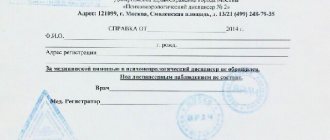In what cases can a notary's deposit be used to fulfill financial obligations?
The creditor is incapacitated and has no representative
For example:
- 1. The court decides whether the creditor is declared incompetent or the creditor’s representative does not have documents confirming his powers
- 2. A minor child does not have a legal representative
The creditor evades acceptance of performance or there is another delay on his part
For example:
- 1. The loan agreement provides for high interest rates and the lender does not want to accept performance
- 2. According to the agreement, property is pledged and the lender is interested in receiving the property, and not in repaying the loan
- 3. The lessor does not accept payment under the agreement for further termination of the agreement
The creditor or the person authorized by him to accept performance is absent from the place where the obligation must be performed
For example:
- 1. The creditor under the agreement changed the details and did not inform the debtor
- 2. The creditor assigned his rights under the agreement and did not inform the debtor - The creditor changed his place of residence
There is obviously no certainty as to who is the creditor of the obligation
For example:
- 1. In connection with a dispute in court
- 2. In the event of the death of the creditor, since within six months from the date of death the circle of his heirs is determined
- 3. The bank’s license has been revoked and the right to receive payments under loan agreements has not yet been transferred to the DIA (Deposit Insurance Agency)
Other cases provided for by law
For example:
- 1. When carrying out the procedure for forced repurchase of shares (Federal Law “On Joint-Stock Companies”)
- 2. During the bankruptcy procedure of an organization (Federal Law “On Insolvency (Bankruptcy)”)
How to settle a transaction
The parties to the transaction must first agree on the settlement of the transaction using the notary's deposit
- 1. under a real estate purchase and sale agreement
- 2. when selling shares in the authorized capital of business companies
- 3. to pay for intermediary services
- 4. under an agreement for the provision of services or performance of work
- 5. when concluding interconnected chain transactions
- 6. under other agreements
Contact a notary to conclude an agreement and make payments for the transaction at the place of fulfillment of the obligation
Thus, certification of agreements on the alienation of real estate objects is carried out by a notary of the constituent entity of the Russian Federation on whose territory the real estate is located.
Conclude an agreement on the procedure for making payments through a notary deposit
The parties to the transaction go together to the notary to enter into an agreement, or only the buyer can come to the notary to deposit money.
Cost of notary services when selling an apartment. Required Categories - Law and Real Estate
The standard package of documents for the alienation of an apartment consists of:
- Documents identifying the parties to the transaction. If the alienator is a minor, you will additionally need:
- general civil passports of legal representatives (parents, guardian, trustee)
- seller's birth certificate;
- permission from the guardianship and trusteeship authority to conclude a transaction.
If the contract is drawn up with the participation of representatives , you will need his passport and a notarized power of attorney.
- Documents of title for real estate (extracts from the Unified State Register of Real Estate or certificates of state registration of rights).
- Documents - the basis for the emergence of ownership of the apartment being sold (various contracts), certificates of inheritance, judicial acts, etc.
- Cadastral passport for alienated property.
- approval of the spouses of the parties to complete the transaction, drawn up in the form of a notarized consent (if the marriage is officially registered);
- Extracts from the house register obtained from the Housing Office.
Why is this necessary and what guarantees are provided?
Selling an apartment through a notary. Responsibilities of the notary:
The notary is responsible for the legality of the transaction. But he is not responsible for failure to fulfill the terms of the contract by the parties, including for the buyer’s payment for the apartment.
He may offer settlement of the transaction through a deposit. This is a paid service.
When paying in cash from hand to hand, the notary is not involved and does not certify the receipt.
When selling an apartment, a notary confirms the conclusion of the transaction , as well as compliance with all legislative and legal norms in this procedure. This right is given to him by the state as a competent witness. In the future, notarized confirmation will help to avoid controversial situations and litigation, and if such arise, it will become a valid basis for resolving the issue in favor of the legal owners.
A notarial deed is a document with increased evidentiary value. This means that this document does not require additional confirmation, and is independently unconditional evidence, which is very important in the event of conflicts and legal proceedings. It can be challenged only in case of falsification of documents or if violations in their preparation are identified.
Drawing up a notarial deed will protect you from the risks of fraud or challenge , which is especially important for large transactions. The guarantee of the effectiveness of the document is the responsibility (property) of the authorized person himself.
That is why, before carrying out the certification, the notary fully checks the legality of the agreement:
- voluntary expression of will;
- awareness when concluding a transaction;
- compliance of documents with legal norms.
Now the range of notary services has expanded. In addition to standard tasks, those requiring the use of new technological approaches to work are also solved, including :
- Instant redirection of legal documentation while maintaining its effectiveness to any region.
- Carrying out state registration of proprietary rights in the shortest possible period of time.
- Protected payment under the contract using a notary's deposit.
- Full-scale collection of the necessary data and redirecting it to state registration authorities by an authorized person unilaterally (without the participation of the customer).
The most current services:
- certification of copies and authenticity of signatures and seals;
- acceptance of documents for safekeeping, as well as cash and shares as deposits;
- certification of the fact of the debt and the obligation to return it by issuing a writ of execution; such a document makes it possible to avoid lengthy proceedings and seek help directly from a bailiff.
Tariffs for notary services
It is known that the activities of notaries (certification and witnessing) are regulated by the legislation of the Russian Federation. Moreover, the law regulates not only the performance of notarial acts, but also the tariffs that determine their cost. However, prices for notary services in St. Petersburg vary greatly and significantly exceed the established tariffs. You can verify this by calling a dozen notary offices.
What determines the cost of notary services when selling an apartment, registering an inheritance or a gift agreement? It turns out that the law only fixes the tariff, and the final cost of the notary service includes work of a legal and technical nature. The cost of the latter is set by the notary himself. And although formally, notarial activity is not a business and, according to the law on notaries, does not pursue the goal of making a profit, in reality, many notaries earn very good money from their services.
It is in the interests of the citizen to find a conscientious specialist who respects the law and in his activities follows the professional code of notaries. One of these notaries on the Petrograd side is Alla Antonovna Pinchuk.
Approved by the decision of the General Meeting of Notaries of St. Petersburg on July 21, 2010, with amendments approved by the Decision of the General Meeting of Notaries of St. Petersburg
October 27, 2010
Methodological recommendations of the Notary Chamber of St. Petersburg on collecting fees for legal and technical services when performing notarial acts provided by a notary.
Selling an apartment through a notary. Making a deal
Not all transactions for the purchase and sale of apartments, rooms and houses are subject to mandatory certification by a notary, but voluntarily - please. Therefore, if you “got” to a notary, rest assured that he will provide a service. Real estate transactions are too tasty a piece.
What can be provided for in an agreement on the procedure for making payments through a notary deposit
The procedure and timing for the issuance (transfer) of funds from the notary’s deposit to the creditor
For example:
- 1. After state registration of the transfer of ownership
- 2. After submitting the acceptance certificate
- 3. After providing a certificate confirming the absence of registered persons in the apartment
- 4. No later than a certain date
- 5. Upon occurrence of other conditions agreed upon by the parties
- 6. A minor child does not have a legal representative
Methods of depositing, transferring, returning funds from the deposit
For example:
- 1. In cash, if the recipient is an individual (not an organization), in this case the notary issues a check or order to the bank for payment
- 2. By non-cash method, for which you need to provide the account number and bank details to the notary
The procedure and timing for the debtor (buyer) to deposit funds into the notary’s deposit
For example:
- 1. Funds are deposited on the day of signing the contract
- 2. Funds are deposited after signing the agreement and before submitting documents for state registration of the transfer of ownership
- 3. Upon occurrence of other conditions agreed upon by the parties
The procedure and terms for the return of funds from the notary's deposit to the person who deposited the money (debtor, buyer)
For example:
- 1. Receiving a refusal from Rosreestr to state registration of the transfer of ownership when selling real estate
- 2. Receiving a refusal from the tax service when making changes to the Unified State Register of Legal Entities regarding a change of participants when selling a share in the authorized capital, etc.
Notary deposit - a new method of mutual settlements for real estate transactions
News and publications
Since January 2020, in connection with changes to the law “On the Fundamentals of the Legislation of the Russian Federation on Notaries,” it has become possible to carry out settlements between the parties to real estate transactions through a notary’s deposit.
This article presents our company’s experience in conducting mutual settlements in this way.
What are settlements through a notary deposit?
Roughly speaking, settlement through a notary deposit is a mixture of settlements through a safe deposit box and through an irrevocable bank letter of credit.
Flexibility in making payments is taken from the depository cell, and openness from the letter of credit. Actually, this is why such calculations have certain pros and cons inherent in both types of these mutual settlements.
In this article, I will not tell you why any methods of transferring money from buyer to seller are needed at all, and why you can’t just give this money away in a transaction. Professionals and “experienced” amateurs already know the answer to this question. And for those who are only interested in real estate transactions, I recommend watching an excerpt about mutual settlements from our seminar “How to buy an apartment”
What does a settlement through a notary’s deposit “in kind” look like?
At least one agreement in the chain must be notarized. Moreover, this requirement differs from one notary to another, and some notaries will want to certify all purchase and sale agreements involved in one transaction.
The purchase and sale agreements include a clause on mutual settlements between the parties through a notary deposit.
- An agreement (notarized) is drawn up between the parties, which describes all the nuances of the upcoming payments: when, to whom, to what current account and how much money will be transferred, and in the event of what events.
This agreement is multilateral, depending on the number of recipients and contributors of funds. You can specify an account in any bank in the Russian Federation as the recipient's account. - After signing all of the above documents, the buyer (or buyers) deposits funds with the notary.
Please note that it is better to deposit funds precisely after signing the agreements, since many banks want to see the details of the signed documents and check the basis for depositing funds.Theoretically, this fact could cause anxiety for the seller. To relieve tension, you can agree to submit documents to register the transfer of rights only after the money has been deposited with the notary.
Depositing money to the notary's deposit can be done either by wire transfer from the buyer's account, or by bringing cash to the bank and depositing it into the account. At the same time, transferring money to the account is conditionally free, since some banks may charge money for technical work. Therefore, it is better to check this point with your bank.
After fulfilling the conditions specified in the payment agreement, the party wishing to receive the money comes to the notary and presents him with documents confirming the fulfillment of these conditions.
- The notary, after checking the submitted documents, transfers money from the notary's deposit to the account that was specified in the agreement.
This operation does not take much time, and the money “falls” into the recipient’s account on the next banking day.Transferring money from a notary's deposit is free. But the recipient's bank may charge a fee for withdrawing cash from the account. I recommend checking this with your bank before the transaction, and, if necessary, choosing another bank.
- After making the above payment, the buyer receives from the notary a certificate confirming the release of money from the notary's deposit. This certificate replaces a receipt from the seller.
- it is not possible to pay for an alternative through them,
- you cannot “pawn” commissions to realtors,
- hold funds against the statement, etc.
As can be seen from the above description, settlements through a notary's deposit have a number of advantages in comparison with settlements through a safe deposit box, and even more so with settlements through a letter of credit.
Payments via letter of credit
mostly inflexible:
I write "mostly inflexible" here because there is at least one bank where you can do much of the above, but the opening of the letter of credit will occur simultaneously.
Those. if you decide to pledge part of the money against the statement, it will be unprincipled, since the “retained” part will still be transferred to the seller at the same time as the rest of the amount. In contrast, from a notary deposit, money can be transferred to recipients at different times.
If we compare the notary’s deposit and the deposit box
. then the following advantages of the first are visible:
- transparency of mutual settlements
- no problems getting a receipt from the seller
- no disputes about where the key is stored
- the possibility of notarizing the purchase and sale agreement and “stacking” the money in one place
- no problems with receiving money in case of technical errors
At the same time, as a big plus, it is necessary to note the cost of settlement through a notary deposit
For example, in the last transaction, together with technical work for which the bank took money, our buyers paid 3,800 rubles. Moreover, if we “mortgaged” in the standard way, we would have to rent three cells and would have paid about 7,500 rubles.
The other side of the coin
Unfortunately, there are not only advantages when paying through a notary deposit. So let's talk about the cons.
First of all
. I would note the reliability. Reliability is not of a notary, but of a bank.
The point is that settlement through a notary's deposit is, in fact, a deposit of funds into a certain bank account. And all possible problems with the bank’s license will definitely affect this account. Those. the buyer can easily lose all the money that was deposited with the notary.
Therefore, when using this mutual settlement tool, it is very important to pay attention to which bank the notary’s deposit account is opened with. And give preference to those notaries who have an account opened in well-known and reliable banks.
The second disadvantage is the possible unreliability of the notary himself
. Theoretically, no one is stopping the notary from withdrawing all the money from the deposit in his own favor and running away. Yes, this is, of course, a pure criminal offense. And yet, theoretically it is possible. Therefore, be sure to pay attention to the reliability and reputation of the notary himself.
The following cons
– it’s not entirely correct to attribute them specifically to disadvantages, but rather these are some technical issues.
For example, settlement through a deposit cannot be carried out at any notary. First, not all notaries have an escrow account. Secondly, not everyone is ready to deal with such mutual settlements: there is a lot of responsibility, and the cost of the work is very low. Therefore, most often such calculations can be considered as a kind of bonus from the notary for conducting a transaction with him.
Well, in fact, if there is no notarization of at least one agreement in the chain, there is no possibility of settlement through a notary’s deposit.
Also pay attention to the need to clearly indicate in the mutual settlement agreement that the buyer can withdraw money from the deposit only in the event of refusal or failure to register the transfer of ownership within a certain period. If this is not specified, then theoretically the buyer can demand a refund at any time.
Conclusion
My personal opinion is that settlements through a notary’s deposit are a rather interesting and convenient tool that has found its niche and is gradually gaining popularity in the real estate market. Especially considering recent changes in legislation, which forced us to make a large number of transactions with the sale and purchase agreement certified by a notary.
I think that if banks issuing mortgage loans also begin to use this instrument, then, due to its merits, it will occupy a significant share of mutual settlements in real estate transactions.
Konstantin Barsukov General Director of RELIGHT-Real Estate
The author expresses his gratitude to the Moscow notary Alexander Vyacheslavovich Fedorchenko for assistance in writing this article
Source: https://ajbook.biz/transit1/depozit-notariusa-novyj-metod-vzaimoraschetov-po-sdelkam-s-nedvizhimostyu/
In what cases can a notary deposit be used?
In order to deposit funds with a notary, certain conditions must be met.
Contact a notary at the place of fulfillment of the obligation
In accordance with the law, the place of fulfillment of the obligation is:
- 1. under the obligation to transfer a land plot, building, structure or other real estate - the location of such property;
- 2. for an obligation to transfer goods or other property that involves its transportation - the place where the property is handed over to the first carrier for delivery to the creditor;
- 3. for a monetary obligation to pay cash - the place of residence of the creditor at the time the obligation arose or, if the creditor is a legal entity, its location at the time the obligation arose;
- 4. for a monetary obligation to pay non-cash funds - the location of the bank (its branch, division) of the servicing creditor, unless otherwise provided by law;
- 5. for all other obligations - the place of residence of the debtor or, if the debtor is a legal entity, its location.
The place of fulfillment of the obligation can be determined by the agreement, for example, under a contract for the sale of real estate located in one constituent entity of the Russian Federation, the place of settlement may be specified in another constituent entity of the Russian Federation.
Indicate the existence of grounds for applying for a notary deposit
If the debtor simply does not want to meet with the creditor who is ready to accept execution, then the notary has no right to accept money as a deposit. To accept funds as a notary's deposit, the debtor addresses the notary with an application in which he indicates his data, the creditor's data, if known to him, and the circumstances (grounds) in connection with which it is impossible to fulfill the monetary obligation. The notary does not check the grounds for the occurrence of a monetary obligation, but it is advisable to present such documents to the notary in order to correctly draw up the application. After accepting the debtor’s application, the notary accepts the money as deposit and notifies the creditor about this, and also issues the debtor a certificate confirming the acceptance of the money as deposit.
Who needs it
Cash and/or securities are accepted for deposit by a notary in cases provided for by current legislation. The list of reasons for transferring money/security deposits to a notary's deposit is exhaustive. In accordance with Art. 327 of the Civil Code of the Russian Federation, the debtor has the right to deposit money/CB into a notary deposit when obligations to the creditor are difficult or impossible to fulfill due to:
- absence of the creditor/trustee thereof at the place of fulfillment of obligations;
- reluctance of the creditor to accept monetary obligations (including cases of delay on the part of the creditor);
- incapacity of the creditor when there is no legal representative;
- inability to determine who the creditor is (in case of disputes between the creditor and other persons);
- in settlements between parties to transactions.
Notary Burchalkin M.L. Accepts funds and securities for storage into a notary's deposit account. For accepting sums/CBs on deposit, a notary fee is charged at the expense of the debtor – the depositor of the money/CB. To calculate the amount of the notary fee, you should contact a notary.








